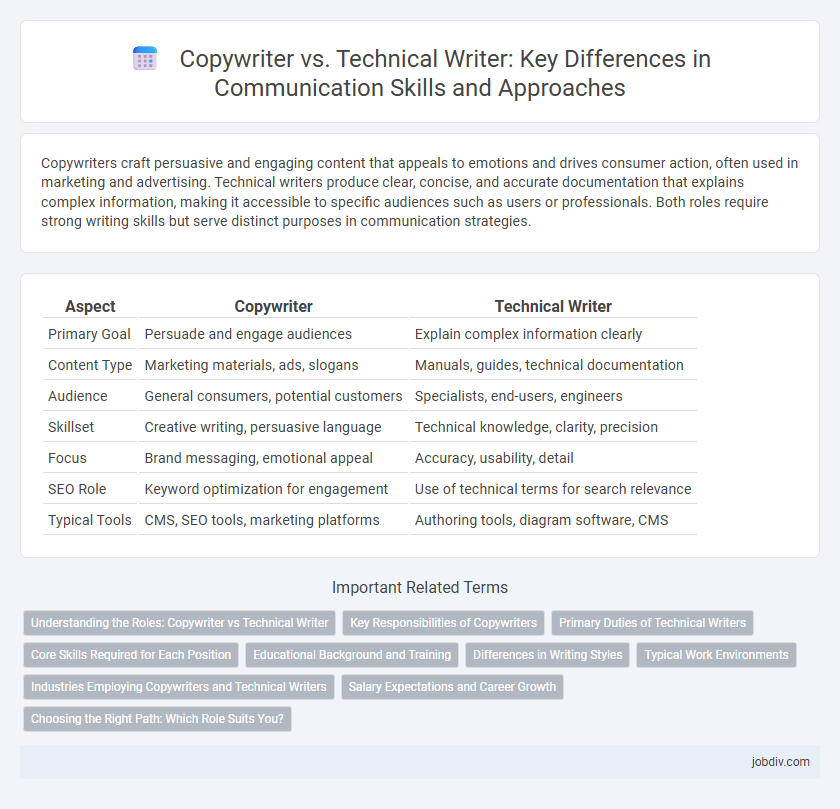Copywriters craft persuasive and engaging content that appeals to emotions and drives consumer action, often used in marketing and advertising. Technical writers produce clear, concise, and accurate documentation that explains complex information, making it accessible to specific audiences such as users or professionals. Both roles require strong writing skills but serve distinct purposes in communication strategies.
Table of Comparison
| Aspect | Copywriter | Technical Writer |
|---|---|---|
| Primary Goal | Persuade and engage audiences | Explain complex information clearly |
| Content Type | Marketing materials, ads, slogans | Manuals, guides, technical documentation |
| Audience | General consumers, potential customers | Specialists, end-users, engineers |
| Skillset | Creative writing, persuasive language | Technical knowledge, clarity, precision |
| Focus | Brand messaging, emotional appeal | Accuracy, usability, detail |
| SEO Role | Keyword optimization for engagement | Use of technical terms for search relevance |
| Typical Tools | CMS, SEO tools, marketing platforms | Authoring tools, diagram software, CMS |
Understanding the Roles: Copywriter vs Technical Writer
Copywriters specialize in crafting persuasive and engaging content aimed at marketing products or services, using creativity and emotional appeal to influence target audiences. Technical writers focus on creating clear, concise, and accurate documentation such as manuals, user guides, and product specifications that facilitate user comprehension and technical communication. Understanding these distinct roles highlights their unique skill sets: copywriters blend creativity with marketing strategies, while technical writers emphasize clarity, precision, and technical expertise.
Key Responsibilities of Copywriters
Copywriters specialize in crafting persuasive and engaging content tailored to marketing objectives, including advertisements, social media posts, and website copy. Their key responsibilities involve understanding target audiences, creating compelling calls to action, and maintaining brand voice consistency. Copywriters collaborate closely with marketing teams to produce content that drives conversions and enhances customer engagement.
Primary Duties of Technical Writers
Technical writers specialize in creating clear, concise documentation such as user manuals, product specifications, and process guides that simplify complex technical information. They collaborate closely with engineers, developers, and subject matter experts to ensure accuracy and usability. Their primary duty is to transform specialized technical content into accessible formats for diverse audiences.
Core Skills Required for Each Position
Copywriters excel in creativity, persuasive writing, and understanding audience psychology to craft compelling marketing messages that drive engagement. Technical writers require strong analytical skills, attention to detail, and expertise in simplifying complex information for clear instructional content, often supported by knowledge of specialized software or industry standards. Both roles demand excellent command of language, but copywriters prioritize emotional impact while technical writers focus on clarity and precision.
Educational Background and Training
A copywriter typically holds a degree in marketing, communications, or journalism, emphasizing creative writing and persuasive techniques to engage target audiences effectively. In contrast, a technical writer usually possesses a background in engineering, computer science, or a related technical field, combined with specialized training in creating clear, concise documentation such as manuals and user guides. The educational emphasis for copywriters is on language arts and storytelling, whereas technical writers focus on mastering complex technical concepts and translating them into accessible content.
Differences in Writing Styles
Copywriters craft persuasive, engaging content designed to capture attention and drive action, often using emotive language and storytelling techniques. Technical writers focus on clarity, precision, and instructional tone to simplify complex information for user comprehension and effective problem-solving. These differences in writing styles reflect their distinct goals: marketing influence versus technical accuracy.
Typical Work Environments
Copywriters primarily work in advertising agencies, marketing firms, or in-house corporate teams, crafting persuasive content aimed at engaging customers and driving sales. Technical writers typically operate within technology companies, manufacturing firms, or governmental organizations, producing clear and detailed documentation such as user manuals, white papers, and product specifications. Both roles may involve collaboration with designers, engineers, and marketing professionals but differ significantly in their specialized environments and content focus.
Industries Employing Copywriters and Technical Writers
Copywriters are predominantly employed in marketing, advertising, and media industries, crafting compelling promotional content to engage target audiences. Technical writers find extensive opportunities in technology, engineering, healthcare, and finance sectors, producing detailed user manuals, product documentation, and compliance reports. Both roles demand strong writing skills but cater to distinct industry needs--creative persuasion versus clear technical communication.
Salary Expectations and Career Growth
Copywriters typically earn salaries ranging from $45,000 to $80,000 annually, with potential for growth in advertising and marketing industries, while technical writers command between $60,000 and $100,000, reflecting demand in specialized fields like software and engineering. Career advancement for copywriters often leads to roles such as creative director or content strategist, whereas technical writers can progress to senior technical writer, documentation manager, or information architect positions. Salary expectations and career trajectories vary significantly based on industry, experience, and expertise in niche communication skills.
Choosing the Right Path: Which Role Suits You?
Copywriters excel in crafting persuasive and engaging content tailored to marketing and branding, making them ideal for those who enjoy creativity and audience connection. Technical writers specialize in producing clear, detailed documentation such as manuals and guides, suited for individuals with a knack for explaining complex information. Understanding your strengths in storytelling versus technical clarity helps determine whether copywriting or technical writing aligns best with your communication career goals.
Copywriter vs Technical Writer Infographic

 jobdiv.com
jobdiv.com